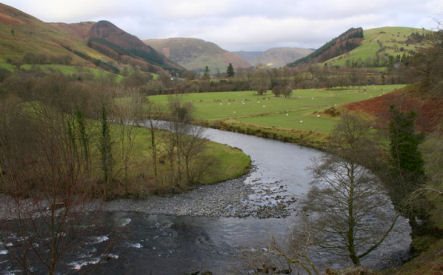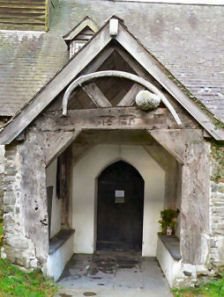Mallwyd
 The small village of Mallwyd,
formerly known as 'Tre'r llan', is situated at the most southern end of the county of Gwynedd in the valley of
the River Dyfi.
The small village of Mallwyd,
formerly known as 'Tre'r llan', is situated at the most southern end of the county of Gwynedd in the valley of
the River Dyfi.
The village lies near the old boundary between the counties of Merionethshire and Montgomeryshire. The nearest village is Dinas Mawddwy, which lies two miles to the north, and Aberangell to the south.
The area was infamous in the sixteenth century for the 'red haired thieves of Mawddwy' or the 'Gwylliad Cochion Mawddwy' who terrorised the area, plundering, murdering and pillaging and who were responsible for the murder of the Sheriff of Meirionnydd, the Baron Lewis Owen, of Cwrt Plas-yn-dre, Dolgellau on 12th October 1555.
The area of Mawddwy was a territory where there were then great difficulties in preserving the law, since it was situated on the boundary between the Welsh Marches and Meirionnyd. The bandits reputed meeting place was at the Brigand's Inn at nearby Mallwyd. They were eventually apprehended in 1555 and many of the band of outlaws were hung. A burial mound on nearby Rhos Groch (The Red Moor) is said to be where their bodies were buried after execution.
The Gwylliad Cochion Mawddwy are recalled in the name of the village pub 'The Brigands', which dates back to the fifteenth century. The pub offers accommodation and very good meals.
St. Tydecho's Church, Mallwyd
 Tradition states that St.
Tydecho's Church was founded in the sixth century. The present church dates to the fourteenth century is an
unusual building, of a long and narrow in shape with a balcony at each end.
Tradition states that St.
Tydecho's Church was founded in the sixth century. The present church dates to the fourteenth century is an
unusual building, of a long and narrow in shape with a balcony at each end.
Many of its fixtures are of seventeenth century origin. Above the carved oak beams on the church door are the remains of two very large bones, which are reputed to be whale bones or tusks which are said to have been unearthed locally. The churchyard contains some very fine yew trees.
The scholar John Davies (c.1567-1644), a native of the village, was the rector of Mallwyd for 30 years. A memorial to him stands in the church which was erected to commemorate the 200th anniversary of his death.
John Davies was one of Wales’ leading scholars of the late Renaissance, a master of Welsh, English, Latin, Greek, and Hebrew. A graduate of Jesus College, Oxford, he was the author of a Welsh grammar and dictionary and was believed to have been the main editor of the 1620 edition of the Welsh translation of the Bible.
Images copyright Chris Denny and Stephen Elwin Roddick